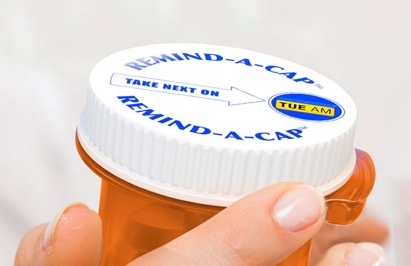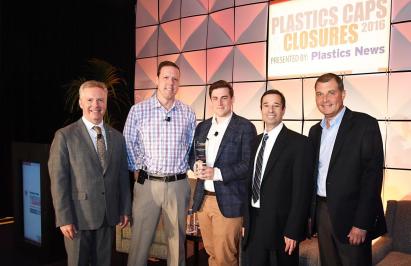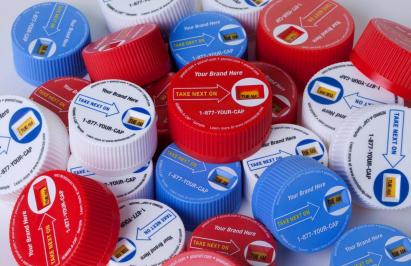September 2, 2016 Updated 9/2/2016
Email Print

Remind-A-Cap With the Remind-A-Cap system, users can manually adjust the dial to let them know when to take the next dose.

Michael A. Marcotte From left: Plastics News Publisher Brennan Lafferty; Paul Lichstein, Carpathian Industries; Matt Ramoundos, Remind-A-Cap; Joe Pryweller, Plastics News conference director; and Marc Fern of M Holland.
Chicago — For Matt Ramoundos, this was something personal. Very personal.
For Paul Lichstein, this was a problem in search of a solution. And he loves to solve problems.
Together, and with the help of many others, this was a chance to work on a passion project aimed at helping make a difference.
Those efforts to bring Remind-A-Cap to market ended up landing the team the first-ever Plastics Caps & Closures Innovation Award.
“This project was really evolved out of necessity. The truth behind it was I invented it when I moved in with my Dad because he was diagnosed with cancer,” Ramoundos said. “He’s very OK now, which was great.
“It was his need for a medication reminder that we developed the product and started to commercialize it,” he remembered at the Plastics Caps & Closures 2016 conference Aug. 31 in Chicago.
Almost $ 300 billion in medication is wasted each year because patients forget to take their pills.
Remind-A-Cap is out to change that.
With a built-in dial, folks manually adjust the day to indicate when they next need to take their medication.
“It’s a simple, affordable product that is easily implemented into the workflow process of the pharmacy,” Ramoundos said. “It helps people remember by simply telling them when to take their medication next.”
For Lichstein, helping to develop Remind-A-Cap afforded his Carpathian Industries LLC an opportunity outside of the company’s normal focus.
“This is not typical of what we do. We are a contract injection molder who specializes in closures and valves for transport of hazardous material,” he said.
But after he learned of Ramoundos’ idea, he knew he had to get involved. And get plenty of others involved as well.
“You have this wonderful idea that definitely makes a lot of sense,” he told the conference crowd. “The fundamental problem that we had is this thing really didn’t exist. So there’s this gigantic risk. And nobody wants to spend millions of dollars on something that is completely unknown. It seems like a great idea, but it has a ton of variables.”

So they tackled the project with an iterative approach, tweaking here and there and keeping costs down until they were satisfied. Along the way, several other companies joined the effort to bring Remind-A-Cap to market. Folks in design, analytics, printing, resins, coloring, testing and welding all lent a hand.
“If you look at that ecosystem, well above half of those companies in that ecosystem are five, eight, 10 employees. People really doing things they love. … For me it was just the joy of getting up in the morning and working with people who are motivated, people who are excited, people who are empowered to innovate,” Lichstein said.
“It’s such a joy to get up in the morning to be part of that team, be able to create something fun, create something new,” he said.
Brennan Lafferty is publisher of Plastics News, sponsor of the conference and the award.
“The passion that Paul and Matt showed in accepting the award really conveyed how much this award meant to them personally and professionally, too. It was truly inspiring,” Lafferty said.
Remind-A-Cap was selected from a group of three finalists that were represented at the Chicago conference.
The others were: Daisy brand’s sour cream squeeze container created by AptarGroup Inc., represented by Dave Johnson, global strategic business development manager; and FunLPro Technology LLC’s line of products that feature extendable funnels built into closures to help avoid spillage, represented by CEO Bryan Crosby.
Remind-A-Cap’s Ramoundos told the audience there also is a clear business reason why pharmacies should adopt his product line.
A study showed that those using Remind-A-Cap filled their prescriptions more regularly, resulting in 1.4 more refills per year. That means more money for retailers as well as pharmaceutical makers.
“People don’t often notice how important a simple cap or closure is to the success of a product. I’m glad our team and our judges were able to shine a spotlight on three innovative caps in three disparate industries that improve function and ease of use,” Lafferty said.




























